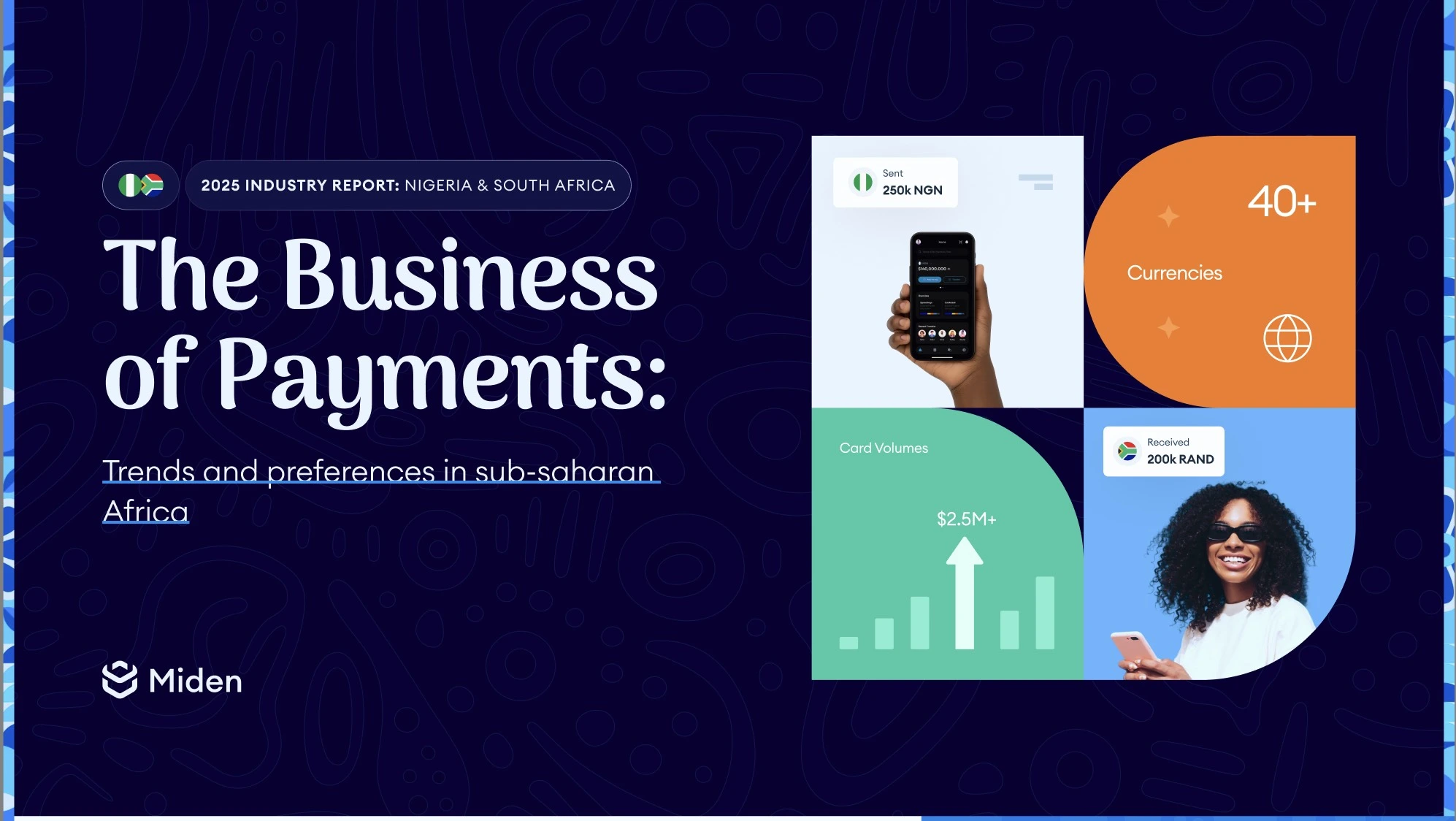Getting paid should be the simplest part of running a business. Yet across Africa, it has become one of the hardest. Payment failures, endless delays, and costly cross-border transfers are holding back business growth.
Miden’s new survey of 303 companies in Nigeria and South Africa reveals the system’s complexity. In Nigeria, more than half of businesses (52%) dealt with complete payment breakdowns in the past year. In South Africa, digital adoption is higher, but that comes with its own headache: over 80% of companies are stuck juggling at least five different payment tools that barely connect with their accounting systems.
For businesses trying to expand across borders, the struggle gets worse. Transfers move slowly, fees eat into margins, and efficiency gets buried under friction.
Both countries handle payments differently, but the takeaway is the same: business payments are still broken, and fixing them could unlock billions in trade.
Two markets, two different crises
Nigerian businesses face a reliability crisis that goes beyond occasional technical glitches. Bank transfers, which account for 94% of local transactions, frequently fail during system upgrades. Mobile money platforms freeze at peak periods like month-end reconciliation. International transfers collapse midway when networks go down.
The consequences are immediate and costly. Manufacturers miss supplier deadlines. Students are unable to pay tuition because platforms crash during banking hours and entire payrolls vanish into digital limbo.
South Africa presents a completely different problem. Their businesses didn’t just adopt digital payment methods; they embraced them enthusiastically. 83% of South African companies now use cards, both physical and virtual, for transactions across Africa.
But success created its own trap. Companies now juggle five or six different payment systems that each work perfectly in isolation but refuse to communicate with their accounting software or ERP systems.
Cross-border reality check
When you zoom into international payments, the approach in both countries is different. Nigerian businesses mostly send money within West Africa (78.57%), with Europe (61.22%) as their next major destination. South African companies spread their reach more widely, maintaining ties across several continents.
Yet, despite these differences, both markets run into the same roadblocks. Cross-border payments are still weighed down by high fees, slow settlement times, complex currency conversions, and too few options for certain trade routes.
The integration challenge behind slow adoption
The research exposes why adoption stalls despite high satisfaction rates. Businesses don’t fear new payment technology; they fear the operational disruption of implementing it badly.
The plethora of payment systems that the average South African business uses generates differently formatted reports, which require standardisation before reconciliation and settlement can occur. Adding another payment method means adding another integration and reconciliation headache.
Nigerian businesses want payment solutions that reduce complexity, not increase it. When new systems create more work instead of less, even superior technology gets abandoned.
Behind these preferences lies an understanding of what businesses in both markets want. Nigerian companies prioritise reliability above everything else, but they also demand systems that integrate seamlessly with existing ERP software and accounting platforms. They want fewer interfaces, not more payment options.
South African businesses, having achieved payment method diversity, now focus entirely on integration. They want solutions that expand merchant acceptance whilst connecting properly with business systems they already use.
Both markets are aligned on cross-border priorities: faster settlement, transparent currency conversion, and broader payment options for specific trade corridors.
The billion-dollar opportunity
The data suggests African businesses aren’t resistant to payment innovation. They’re hungry for solutions that actually work.
Virtual card adoption among aware Nigerian businesses exceeds 80%. South African companies built multi-rail systems that would impress London finance teams.
Miden’s findings suggest African payment infrastructure has reached a critical transition point. Businesses demonstrated they’ll enthusiastically adopt new technology when it works reliably and fits properly into existing operations.
The market opportunity isn’t about convincing companies to try digital payments. It’s about delivering solutions that actually integrate with how businesses operate day to day.
These findings in Miden’s “State of Business Payments in Nigeria and Africa” report capture a moment of transition in Africa’s largest economies. Understanding these dynamics could inform better business decisions, smarter payment strategies, and more effective product development for anyone operating in or serving these markets.
Read the full findings: Miden’s “State of Business Payments in Nigeria and Africa 2025” report contains the complete data and analysis behind these insights.
Get passive updates on African tech & startups
View and choose the stories to interact with on our WhatsApp Channel
Explore




